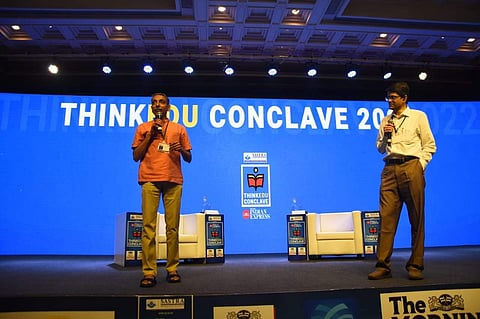

Access, equity, quality, affordability and accountability. These are the fundamentals the National Education Policy (NEP) is based on, said M Jagadesh Kumar, Chairman, University Grants Commission (UGC) in conversation with S Vaidhyasubramaniam, VC SASTRA Deemed-to-be University. They were discussing the topic 'Educating Indians for the Next Century' at the 10th edition of the ThinkEdu Conclave, organised by The New Indian Express on March 8.
"One formula will not fix the problems of education. We need all types of educational institutions. We need universities that are researching, we need open universities and institutions for distance learning and skilled courses among others. NEP has the potential to deliver results beyond our generation and its shelf life of it will be longer than the previous two versions," said Vaidhyasubramaniam.
He added that the first draft of NEP 1968 was when education was in the union list. In 1986 (second version), it was in the concurrent list. What makes NEP special is that the definition of education itself has changed. It captures the changing dimensions in the paradigm shift of education which has been accelerated by the COVID pandemic. Education has evolved in numerous ways. It includes unlearning, skilling, training, vocational education and everything that fits in the terminology.
Concurring, Jagadesh Kumar said that students have divergent cognitive abilities, different financial capabilities and aspirations. "How we make our higher educational institutions relevant to the needs and aspirations of the youth is the challenge that we have in front of us and the NEP lays down the pipeline to realise the aspirations of our people. Today's youth want to be effective and lifelong learners. They want to be creative and innovative. These are the fundamentals NEP is designed upon," he said.
Jagadesh also touched upon the importance of multidisciplinary learning. "Recently, we have issued the guidelines on how to introduce multidisciplinary education in our educational institutes. For instance, if an institution is more focused on science, we are recommending opening departments in other areas, such as social sciences, languages, international relations, national security among others. This goes a long way in learning."
ThinkEdu 2022 is the grand tenth rendition of what has consistently been India's biggest education conclave for a decade now. March 8 and 9 will see some stalwarts of India's academic, economic and political ecosystems bring ideas, ideologies and reflections on the past, present and future of India's education system. The sessions will be viewed by a live audience, in addition to the 2,750 registered users on the conclave's digital space. Over the last nine years, the conclave has seen some true stalwart thinkers such as former presidents Dr APJ Abdul Kalam and Dr Pranab Mukherjee, MPs Jairam Ramesh, Smriti Irani, former CM of Jammu and Kashmir Farooq Abdullah, NITI Aayog's CEO, Amitabh Kant and spiritual guide Sadhguru.
